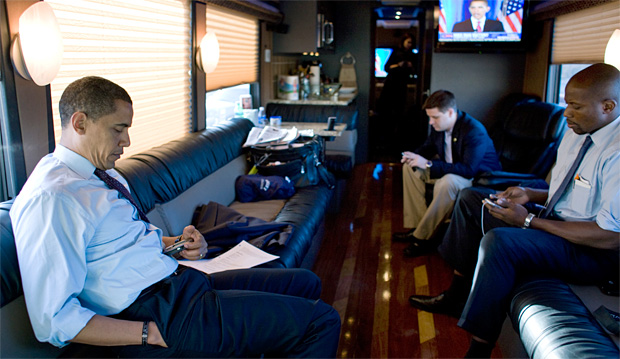President Obama's top-secret iPad


U.S. President Barack Obama made waves when he was the first chief executive to use a BlackBerry. A government insider now says that the U.S. National Security Agency hardened an iPad for Mr. Obama to review state secrets disclosed in his daily intelligence briefing.
Last Friday, a non-profit professional organization called Information Security Systems Association (ISSA) held a meeting in Baltimore where the NSA's Dr. John Levine was the keynote speaker. Levine discussed a trend of how government and military officials were demanding the high productivity of today's latest consumer electronics. The President is not exception, so the NSA set about securing his iPad.
"The president is getting his daily intelligence briefing on an iPad. Ten years ago we wouldn't have done that, but that's what the president wants, so that's what he gets. Now, that iPad is neutered-it has no connectivity. It gets plugged into a docking station. We can do that for the president, but can we can't scale that. So the question is, can we use commercial products that are secure?" said Levine.
That quote is attributable to American Civil Liberties Union's senior policy analyst Jay Stanley, who attending the meeting and blogged about it. Levine's talk noted that NSA officials are cooperating with communications service providers (CSP) to use commercial networks (voice and data) for classified calls, buying capability from CSPs in much the same way that services like GM's Onstar do.
I'm reminded of news from May about how microprocessors manufactured in China were alleged to have a backdoor that could potentially be exploited for espionage. Chinese electronics maker Huawei Technologies sits at the center of the controversy, but has denied any malfeasance both publicly and to the U.S. House Intelligence Committee. That may give room for some pause.
Despite this concern, I have a high degree of confidence in the NSA's ability to secure devices like the ObamaPad. It is a center of excellence for cyber security, which was impressed that upon me during an interview with a high-ranking official in its integrity assurance division several years ago.
The question is could it be doing its job too well?
The ACUL's Stanley cautioned that consumer companies may be too cozy with government officials, citing a recent Apple patent that permits an iPhone's functionality to be disabled from a central source. He also cited recent comments by the NSA Director that the national security state is putting pressure on private CSPs.
"Information assurance can be good for privacy but can also block the next whistleblower who is trying expose things that will help our country but cause pain (in the short term) for a national security bureaucracy," Stanley said.
"...We don't want to see security and top-down control given priority over openness and individual control."
(Image Credit: Pete Souza/ Rapport Press )
Related on SmartPlanet:
This post was originally published on Smartplanet.com